Keywords: Climate Crisis
There are more than 200 results, only the first 200 are displayed here.
-
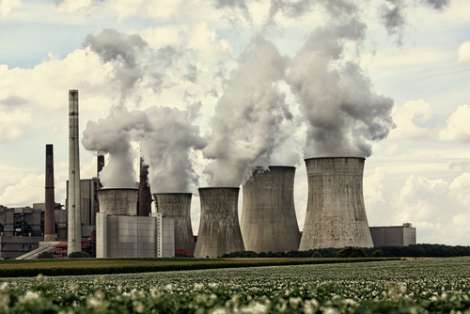
AUSTRALIA
- Andrew Hamilton
- 27 July 2015
15 Comments
The Federal Government's ethical argument for coal is that it is the most readily available and cheapest resource for generating electricity for the development of poorer countries. The structure of this argument based on our duty to the poor is significant. It assumes that governments, mining companies, banks and the people who invest in them a duty to consider the effects of their actions on people both in their own nations and in other nations.
READ MORE 
-
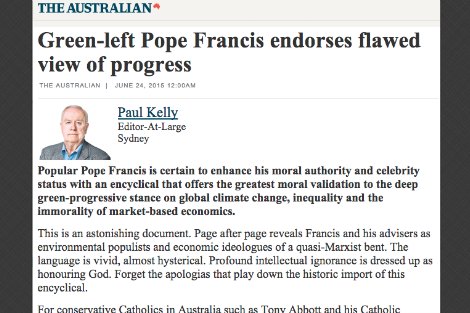
RELIGION
- Bruce Duncan
- 10 July 2015
37 Comments
In a series of articles, The Australian newspaper has strongly criticised the new encyclical Laudato Si', with editor-at-large Paul Kelly charging that the Pope has 'delegitimised as immoral' pro-market economic forces. This is wrong. Pope Francis is not opposed to the free market in principle, but insists that it be well regulated to ensure social justice for all involved.
READ MORE 
-

- Frank Brennan
- 08 July 2015
3 Comments
I suspect Pope Francis had some of our Jesuit alumni in mind when he wrote in his encyclical Laudato Si: 'A politics concerned with immediate results, supported by consumerist sectors of the population, is driven to produce short-term growth... True statecraft is manifest when, in difficult times, we uphold high principles and think of the long-term common good. Political powers do not find it easy to assume this duty'.
READ MORE
-
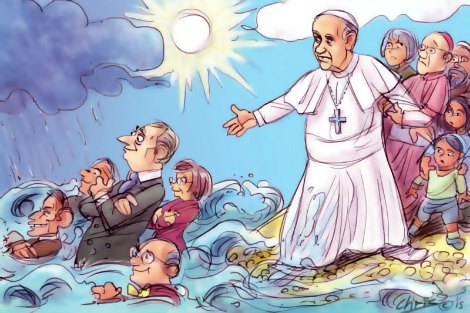
RELIGION
Both John Paul II and Benedict XVI made passing reference to environmental issues. Benedict spoke of the need for protection of the environment, resources the climate in his encyclical Caritas in Veritate. But in terms of its significance, Pope Francis’ forthcoming encyclical has the potential to do for the environmental movement what Pope Leo XIII’s Rerum Novarum (1891) did for the union movement – to provide it with a powerful source of moral and religious legitimacy in the face of those forces which have sought to limit their influence.
READ MORE 
-
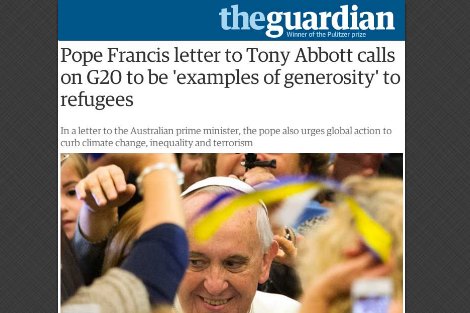
AUSTRALIA
- Andrew Hamilton
- 14 November 2014
18 Comments
The news that Pope Francis has written a letter to Tony Abbott makes one pause. It is usual for Popes to write such letters, and luckily this one is no shirtfront. Instead it will probably be treated as a hospital pass. The trouble with swerving away from hospital passes, though, is that the watchers may see you as cowardly.
READ MORE 
-

AUSTRALIA
- Frank Brennan
- 22 September 2014
5 Comments
Considering my indebtedness to the two Aborigines who met [my family's ship arriving in Hervey Bay from Ireland] 151 years ago, I owe it to all my fellow Australians to agitate these issues of law, morality and politics here in Ireland so that back in Australia, the homeland which, in my religious tradition, was known as the Great South Land of the Holy Spirit.
READ MORE
-
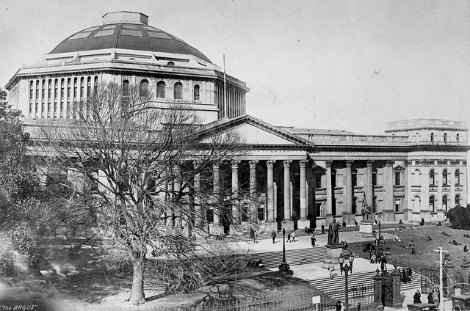
MARGARET DOOLEY AWARD
- Andy Lynch
- 27 August 2014
9 Comments
The kind of Australia we live in today can be directly attributed to the kinds of institutions built 150 years ago - schools, universities, libraries, museums, and more. But in 2014 is it even possible to carve out new public institutions or give new life to those that have waned in relevance?
READ MORE 
-
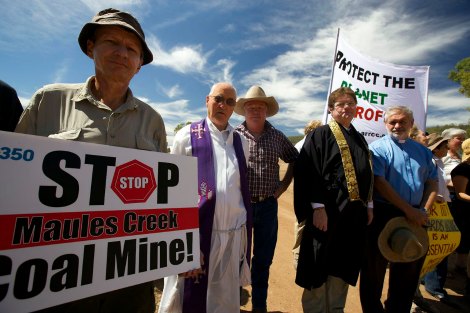
ENVIRONMENT
- Thea Ormerod
- 19 March 2014
14 Comments
The arrest last week of three identifiably religious people drew attention again to Whitehaven's new coal mine site at Maules Creek, in northern NSW. Why did these people of faith feel it was time to put their bodies on the line? Simply put, when the law is fully harnessed to keep in place a system that many consider to be immoral, the most ethical action is peaceful, non-violent disobedience.
READ MORE 
-
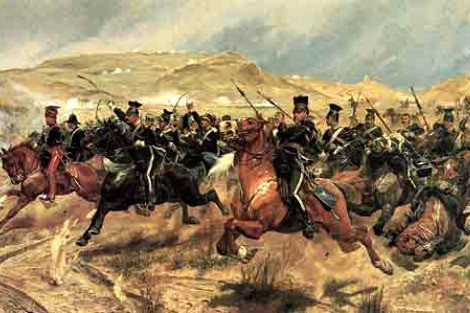
AUSTRALIA
Tony Abbott's 'We warn the Czar' statements were ludicrously over-the-top, though clearly he was responding to a Washington appeal to friendly allies to say something. I hope Australia will not continue to overplay its hand in the Security Council. There is no point in gratuitously offending Moscow on an issue that is outside our strategic area of interest and raises no human rights concerns whatsoever.
READ MORE 
-

ENVIRONMENT
- Neil Ormerod
- 11 February 2014
12 Comments
The international movement to divest from investment in fossil fuels is gathering momentum. Investors are starting to realise that as governments act to restrain fossil fuel consumption, fossil fuel companies will find their assets being written down. This is particularly pertinent to Australia, the second largest coal exporter. And it raises questions for Australian religious bodies about the prudent and moral use of their resources.
READ MORE 
-

RELIGION
- Frank Brennan
- 08 November 2013
1 Comment
'Many Catholics wonder how we can maintain our Christian faith at this time in the wake of the sexual abuse crisis and the many judgmental utterances about sexuality and reproduction. The Church that has spoken longest and loudest about sex in all its modalities seems to be one of the social institutions most needing to get its own house in order.' Frank Brennan's address to the Yarra Institute for Religion and Social Policy, 8 November 2013.
READ MORE
-

AUSTRALIA
- Frank Brennan
- 13 August 2013
1 Comment
'Like many Australians, I had hoped that the dastardly plan announced on 19 July would stop the boats in the short term, as a stop-gap measure. It is dismaying to learn that appropriate consultations had not occurred with Indonesia with the result that the very people who were to receive the shock and awe message are yet to receive it. There’s only one thing worse than shock and awe; that’s shock and awe that doesn’t work because you haven’t done your homework.' 43rd Barry Marshall Memorial Lecture, Trinity College Theological School, 14 August 2013.
READ MORE